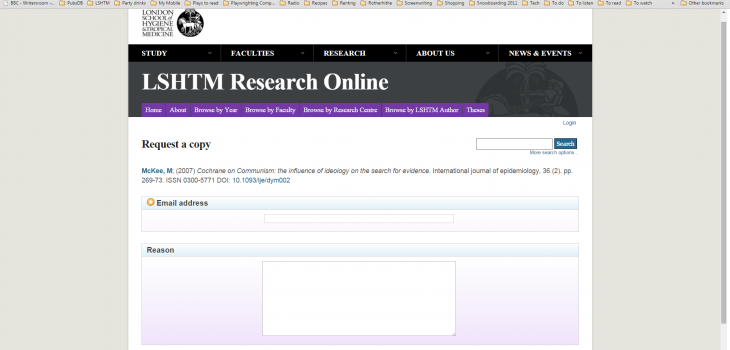LSHTM Research Online is the freely accessible online database of research conducted by staff from London School of Hygiene and Tropical Medicine. Where possible we provide access to the full text of research articles, where we are unable to provide the full text we will hold the bibliographical information and provide links to where the full text can be accessed. But currently only 29 percent of our content is full-text or has a file attached to it (that’s
9055 items out of 30,000) so there is a lot of research publications that are just bibliographic records.
However, researchers can now share their papers via the ‘Request a copy’ function in our repository which allows users who wish to access the paper to request it from a named researcher in the School.
How does this work?
Authors are likely to have assigned Copyright in a publishing licence agreement to the publisher and the policies of publishers normally imply that sending even a single copy of the article would be illegal unless explicitly authorized by the publisher. However – and these policies usually don’t mention it – the fair use (US) and fair dealing (Australia, Canada, UK, and other Commonwealth countries) provisions – or exceptions – of the copyright laws make this act legal if it satisfies certain criteria and, if it is done for one of a few specific purposes, most of them common to all these jurisdictions: research, study, criticism, and news reporting. [1.Sale, Arthur, Couture, Marc, Rodrigues, Eloy, Carr, Les and Harnad, Stevan (2014) Open Access Mandates and the “Fair Dealing” Button. In, Dynamic Fair Dealing: Creating Canadian Culture Online (Rosemary J. Coombe & Darren Wershler, Eds.). , University of Toronto Press.]
The ‘Request a copy’ function in our repository allows the requestor to provide a valid research reason for you to share an item and since we have launched about a dozen requests have been received by researchers in the School, from all across the world.
It’s important to add that if the final draft copy of the paper is uploaded to the record the request a copy function will not appear – so it’s in researchers’ interests to make their papers as openly available as possible by sending the Repository team a copy of their paper.
We hope researchers in the School find this function useful in further widening access to their research.







